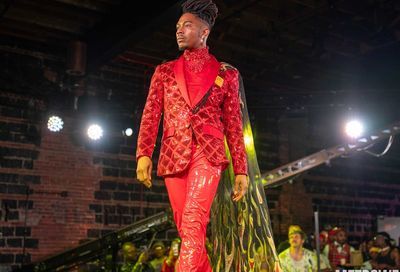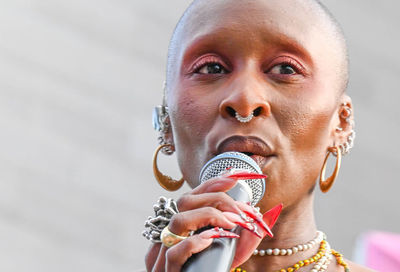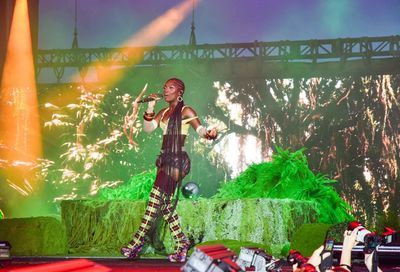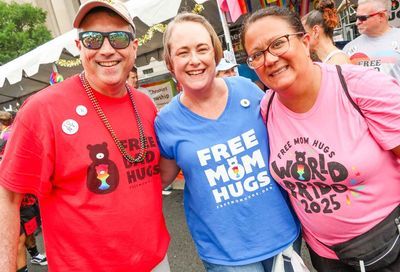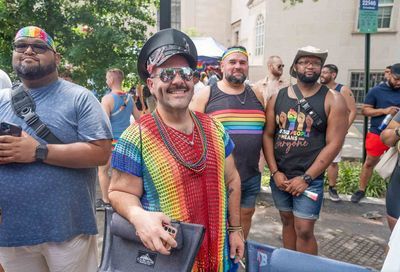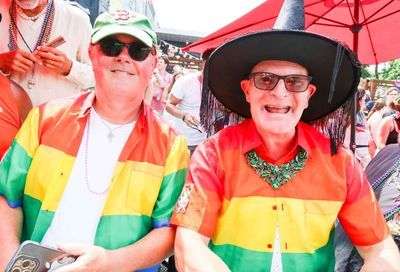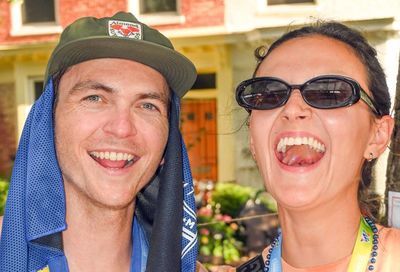Parenting in the Pink
Groups launch local, annual LGBT parenting conference
Ellen Kahn set a storybook tone last Saturday morning as gay parents — and prospective parents — and their kids gathered at Sligo Middle School in suburban Silver Spring for the first annual D.C. Metro LGBT Parenting Conference. This middle school was chosen, she explained, because elementary schools’ offered chairs that were too small, while high schools had schedules that were too busy. Sligo, however, was just right.
Plus, at least a handful of fathers on hand would likely qualify as bears.
Roughly 150 adults gathered in the school’s cafeteria on April 30, while an untold number of children and teens occupied other parts of the school with their age-appropriate peers. With the commonality of parenting issues to bind them, strangers were quick to start conversations.
“We really want to build the community of LGBT families,” said Kahn, the interim chair of Rainbow Families-D.C. and the head of Whitman-Walker Clinic’s Lesbian Services Program, as she welcomed participants. To that end, beads were available for single parents to make themselves known to one another. “We want to connect parents with similar issues and needs with one another.”
A number of sponsoring groups were on hand to foster that connection: the Family Pride Coalition, a D.C.-based national group; San Francisco-based COLAGE, Children of Lesbians and Gays Everywhere; Whitman-Walker Clinic’s Lesbian Services Program; and Rainbow Families-D.C., which is currently housed at the Whitman-Walker.
Aimee Gelnaw, a former executive director of the Family Pride Coalition, got the gathered down to business with an hour-and-half panel discussion. Between herself and the four panelists, Jim Clay, Cayo Gamber, John C. Parkhurst and Bonnie Rock, gay parenting was shown to offer universal constants as well as challenges unique to each family.
“I never really wanted to be a parent,” Clay began, explaining that he finally concluded that his partner’s desire for fatherhood combined with his own professional experience with children was reason enough to move forward. And his motivation grew as he even made an “adoption book,” the adoptive parents’ equivalent to the “baby book.” Holding it before the crowed, he joked, “You can tell it’s authentic mid-’80s because of the dot-matrix printer.”
There wasn’t much more humor in Clay’s story, as he told everyone about his son, whose comfort level has vacillated. “There was a period when he thought it was cool to have gay parents. Â… [Today] he insists he’s not in a ‘normal family.'”
Rock started her journey to motherhood on Clay’s path, but it diverged. “I grew up saying I will never have children, I can’t stand children. I have no idea what happened.” she says, today a mother of two adopted girls, who did Clay’s adoption book one better. “I went to scrap-booking class.”
Parkhurst also adopted. “I was sitting on the beach in Rehoboth, 40 [years-old], at the end of another in a long stream of failed six-month relationships,” he recalled of the moment when he decided to pursue parenting alone. “If I was going to be a dad, I’d better get on the stick.” Today, he’s father to twin boys from Vietnam.
Gelnaw and Gamber offered some insight regarding surrogacy. Gamber told of her and her partner getting sperm from a “known donor,” a phrase she faults. “I hope we’re going to find more elegant language for ‘known donors,'” she said. ” It’s such an amazing act on the part of men. As we keep telling these stories, we’re going to get the language we need.”
Judging by the crowded cafeteria, there is obviously a need for stories to be told, for dialogue, and for questions when it comes to gay parenting. From the crowd, there was a flurry of comments and questions for the panelists. Do cultural norms confuse a child with gay parents, for example?
“Right now I’m having a little trepidation about next week and Mother’s Day,” Parkhurst offered. “We’re going to have some hard talks this week.”
What about children asking about their biological beginnings? Breaking reproduction down into an age-appropriate “seed” and “egg” formula might keep things from getting too complicated, Gelnaw replied. Added Gamber: “The seed-and-egg thing is very nice. It sounds very spring.”
Of course, prospective single parents wanted to know how parenting might impact their social lives.
“I take things a lot slower,” shared Rock. “I learned boundaries are our friends. The first few years, I didn’t date at all.”
A very delicate question is one likely to be asked of same-sex parents by their detractors: How do gay parents bring in opposite-sex role models for their children?
“What we hear from grown children [of gay parents], is this is not their issue,” answered Gelnaw, who, aside from having helmed the Family Pride Coalition, also has a professional background in child and family development. “Their notion of family changes, based on who comes and goes in their lives. Children need at least one consistent, reliable person in their lives. But the more the merrier. Â… They’re not focused on these differences and deficits.”
Instead, she said, children see families like they see houses on a street — each one different, but each a house nonetheless.
As more LGBT people become parents, this conversation will grow. Kahn held out hope that next year’s conference will double in attendance. Organizers at the conference asked that to help inform the conversation, LGBT parents with school-age children, or any children 13 or older with an LGBT parent, go on-line to complete an LGBT Families & Schools Study survey offered by the Gay, Lesbian and Straight Education Network at www.glsen.org.
Support Metro Weekly’s Journalism
These are challenging times for news organizations. And yet it’s crucial we stay active and provide vital resources and information to both our local readers and the world. So won’t you please take a moment and consider supporting Metro Weekly with a membership? For as little as $5 a month, you can help ensure Metro Weekly magazine and MetroWeekly.com remain free, viable resources as we provide the best, most diverse, culturally-resonant LGBTQ coverage in both the D.C. region and around the world. Memberships come with exclusive perks and discounts, your own personal digital delivery of each week’s magazine (and an archive), access to our Member's Lounge when it launches this fall, and exclusive members-only items like Metro Weekly Membership Mugs and Tote Bags! Check out all our membership levels here and please join us today!





















